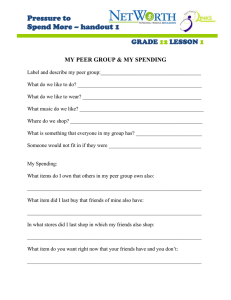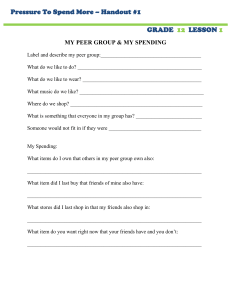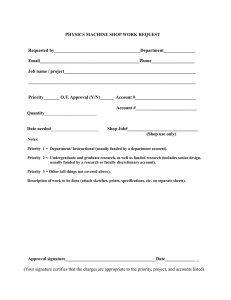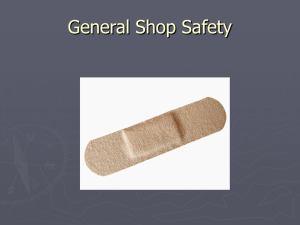What is ?
advertisement
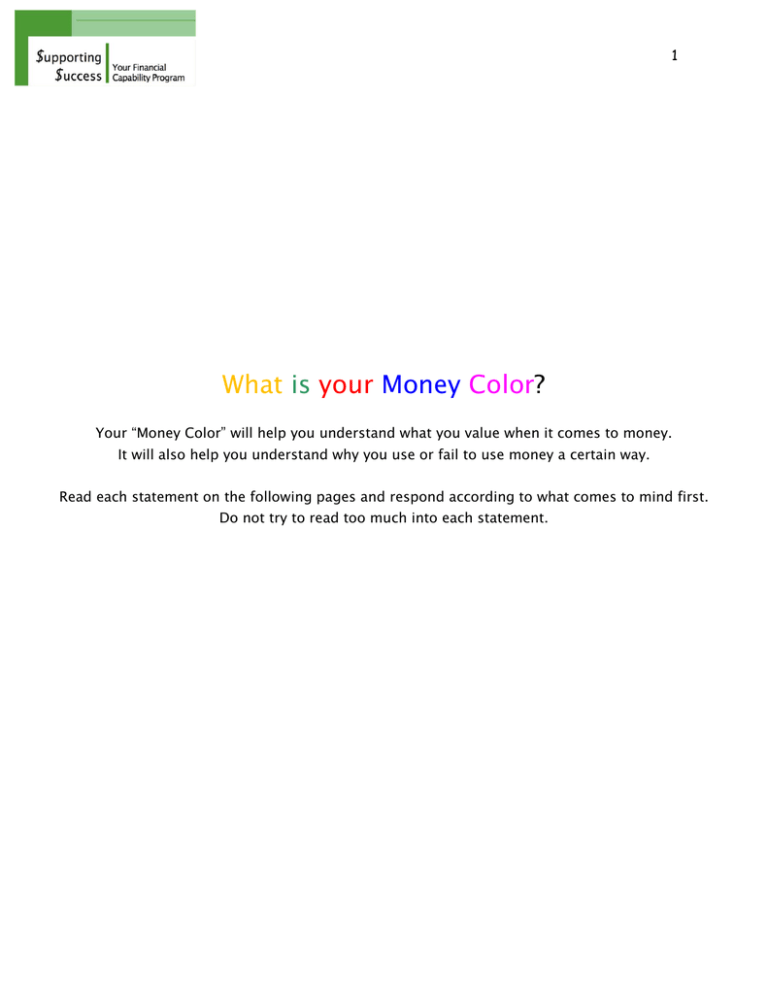
1 What is your Money Color? Your “Money Color” will help you understand what you value when it comes to money. It will also help you understand why you use or fail to use money a certain way. Read each statement on the following pages and respond according to what comes to mind first. Do not try to read too much into each statement. 2 Check the following YELLOW statements that you agree with. _____ Budgeting is a waste of time. You either have enough money or you don’t. _____ It never helps anyone to worry about money. _____If you are ever in financial trouble, someone somewhere will help. _____ Don’t worry about it if you live from check to check, at least you’re living. _____ It will drive you crazy trying to keep up with every penny you spend. _____ Using credit is the answer to getting what you want without worrying. _____ Saving a lot of money is not that important. _____ There’s little need to set goals and plan how money will be used. _____ If one is patient money problems will go away and take care of themselves. _____ One area a person with limited income can skip is health insurance. YELLOW statements you agreed with (number of checks you made) Check the following GREEN statements that you agree with. _____ Children should have the BEST education money can buy. _____ You can tell if one is successful by their car and neighborhood. _____Owning certain brand names are a MUST. _____ It is important to be able to treat friends with gifts and meals. _____ You should never let others know if you have to pinch pennies. _____ I will do without if I can’t have the best. _____ It is important to look successful. _____ Getting ahead will require you to spend a little more than you can afford. _____ A high salary means you are successful and have made it. _____ Cheap stuff is cheap and of poor quality. GREEN statements you agreed with (number of checks you made) 3 Check the following RED statements that you agree with. _____ How we spend money tells other what is important to us. _____ There are many things more important than money. _____We must teach young people there is more to life than money. _____ It’s nice to make personal gifts, even if you can afford to buy them. _____ It makes little sense to try and keep up with what other people have. _____ Money cannot buy true love and happiness. _____ A lot of money would be nice to have, but not necessary to have. _____ There are lots of things to do that are more fun and do not cost money. _____ It’s silly to buy the most expensive just because it’s the best & most expensive. _____ I’d prefer a job with less pay and less work hours so I can do things I enjoy high pay and long work hours. RED statements you agreed with (number of checks you made) Check the following BLUE statements that you agree with. _____ Buying something new always makes me happy. _____ A person deserves to have some nice things in life. _____It’s hard to wait for something you really want. _____ It would be easy to spend $10,000 in a week. _____ The more money you have the more you want to spend. _____ Credit is one of the best things in life. _____ Walking through stores when you have no money is depressing. _____ It would be wonderful to be a millionaire with lots of money to spend. _____ No matter how much I have I can always use more and I want more. _____ If I want something, I should have it now. BLUE statements you agreed with (number of checks you made) over 4 Check the following PINK statements that you agree with. _____ Every debt should be cleared up as you go along. _____ It’s a good feeling to have money to spend. _____Don’t buy until you really need something. _____ You should budget your money and stick to the plan. _____ There should always be enough money in the bank for emergencies. _____ It’s important to keep a record of everything you spend. _____ Shop around until you find the best price. _____ A person needs a lot of insurance. _____ Paying cash is the best way. _____ Thrifty people manage best. PINK statements you agreed with (number of checks you made) Transfer your number of checks for each color: YELLOW GREEN RED BLUE PINK July 2012 Joan Sprain Adapted by: Celvia Stovall, FRM Specialist – North Carolina State University Original version developed by: Dena Wise – FRM Specialist – UT Extension An EEO/AA employer, University of Wisconsin-Extension provides equal opportunities in employment and programming, including Title IX and ADA requirements. Copyright (c) 2012 by the Board of Regents of the University of Wisconsin System doing business as the Division of Cooperative Extension of the University of Wisconsin-Extension. 5 The Color of Money Key Knowing your “Money Color” will help you better understand your money values. Most people will check at least one question under each color. Some may respond to an equal number of questions under each color. If so, you may have competing money values. Your money is a resource to assist you in reaching goals and getting the things you need and want. If your values or how you use money prevents you from reaching your financial goals, consider changing your money habits. Remember, you can change habits once you become aware of them. Listen carefully to determine what your money colors say about you and what risks you are likely to face if you fall into a specific money color. The color with the highest value will represent your dominant money color. YELLOW Money is not very important to you and you seldom worry about it at all. You are more likely to: • expect others to come to your rescue when faced with a financial problem • think problems will work themselves out • not see the value in planning ahead You are less likely to: • use a spending plan/budget • save for emergencies • have options if financial situations occur in the family 6 GREEN Money is valued for the status it provides. You are more likely to: • appreciate items if it is considered prestigious (name brands, neighborhood, car) • over-use credit and over spend • impulse shop for a rare item You are less likely to: • shop sales, compare prices or look for bargains • consider the cost of an item as long as it is the right name brand • be concerned about prices, especially if it’s an investment & can appreciate in value RED Money itself is not important. It is how one uses money to enhance their life or to improve the quality of their life that makes it important. Reds are pretty balanced with it comes to managing money. You are more likely to: • have financial goals • have good insurance • save and invest • plan spending • compare prices and shop for the best deals You are less likely to: • check and update financial plans and goals as needed • know how much has accumulated in investments and savings • know values of life insurances and etc. 7 BLUE Money is valued for pampering or treating self. You are more likely to: • shop when stressed or unhappy • justify why it’s ok to go shopping instead of paying bills • spend savings on what is wanted over what is needed You are less likely to: • say no to treating self, especially when sad or depressed • have limits on spending when there is a strong desire to have something • have a reason for spending • have a spending plan and savings you can stick to PINK Money is valued for security You are more likely to: • have family members and friends to come to them for loans • have a $10 or $20 hidden in a wallet or checkbook for emergencies • get frustrated with others who appear to be careless spenders You are less likely to: • make any purchase before shopping for the best deal • impulse shop • shop just for the fun of it We can change our actions and develop skills to make our money colors work for us! July 2012 Joan Sprain Adapted by: Celvia Stovall, FRM Specialist – North Carolina State University Original version developed by: Dena Wise – FRM Specialist – UT Extension An EEO/AA employer, University of Wisconsin-Extension provides equal opportunities in employment and programming, including Title IX and ADA requirements. Copyright (c) 2012 by the Board of Regents of the University of Wisconsin System doing business as the Division of Cooperative Extension of the University of Wisconsin-Extension.
